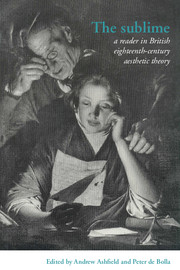Part II - Rhapsody to rhetoric
Published online by Cambridge University Press: 05 June 2012
Summary
Towards the end of the seventeenth century Novelty [Addison] acquired enhanced status as the role of domestic consumption and the psychology of appetites began to feature prominently in economic debates. The concept was further augmented through the recognition of the function of novelty in the exercise of the Passions, found pre-eminently in moral sense theory. Augustan culture placed a premium on Wit and Invention and was particularly attracted to metaphorical usage based on novel turns of thought. Throughout the century Novelty continued to maintain an important role, reaching a high point of interest in Adam Smith's enquiry into its role in the origin and growth of the arts and sciences. Its value, however, diminished with the recognition that unlike the sublime or beautiful there was no intrinsic value to Novelty.
The concept of Novelty was further tarnished in its association with the new literary form of the novel, which increasingly came under attack for both its emasculating properties and as a corrupter of female morals. By the end of the century Novelty began to lose its role as a cypher in moral theory and began to attract hostile criticism. From this vantage point Novelty began to be linked to human caprice, inconstancy and superficial sentimentality. While in romanticism the value of Novelty began to be overtaken by a formidable investment in the concept of originality.
Early discussions of Romance are intrigued by the enchantments of the hero [Addison] who often comes to the rescue of distressed damsels.
- Type
- Chapter
- Information
- The SublimeA Reader in British Eighteenth-Century Aesthetic Theory, pp. 57 - 61Publisher: Cambridge University PressPrint publication year: 1996

